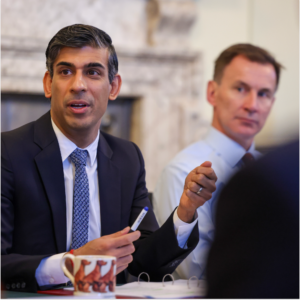UK Chancellor, Jeremy Hunt, delivered economic plans in his Autumn Statement budget for the following years ahead. This article will provide an explainer on the key takeaways.

November 28, 2023, London, UK. Prime Minister Rishi Sunak (L) and Chancellor Jeremy Hunt during the Cabinet meeting.
December 1, 2023
Autumn Statement 2023: Four key takeaways for the UK economy
What is the Autumn Statement and who delivers it?
The Autumn Statement, which takes place each year, is an update on government plans for the economy delivered by the Chancellor of the Exchequer. It is based on up-to-date forecasts from the Office for Budget Responsibility (OBR), a public body that gives independent economic analysis and predictions of the UK’s public finances.
On November 22, Jeremy Hunt, who has been Chancellor of the Exchequer since October 2022, focused on the economic challenges that the UK is currently facing, one of which being the cost of living crisis. Hunt also outlined the intentions for the country to produce an “AI Powerhouse” by funding “innovation centres” developing visual arts and an AI ecosystem.
Also present was the introduction of tax reductions as well as plans to foster business incentives.
Why is the Autumn Statement important?
It looks at the state of the economy and the current status of the country’s finances and sets out future plans on how the government will address tax and spending plans for the years ahead.
The government sets out “long term decisions to grow the economy.”
Did you miss the Autumn Statement last week?
Watch below to hear from Chancellor @Jeremy_Hunt on the top things you need to know ⬇️ pic.twitter.com/8xXLOEskGh
— HM Treasury (@hmtreasury) November 28, 2023
Here are the four key takeaways:
1: AI Powerhouse – £500 million investment
Hunt emphasised the significance of technology and the pivotal role that artificial intelligence will play in the future. The UK will be supporting technological innovation by providing centres £500 million in funds over the next two years.
Specifically he will be “building on the success of the supercomputing centres in Edinburgh and Bristol” with the hopes of transforming the country into “an AI powerhouse.”
2: Tax reductions – employees/self employed
The government plans to reduce National Insurance from 12% to 10%. As a result, an average worker earning £35,000 a year saves £450, starting from January 2024.
This reduction will also transfer to the self-employed by cutting class 4 tax from 9% to 8%, saving them £340 on average.
“That’ll benefit 29 million hardworking people,” said the chancellor.
3: Business incentives
The Chancellor outlined that they have delivered the ‘biggest permanent business tax cut in modern British history’, by giving 25 pence discount on a business’ tax bill if they invest a pound in equipment like computers, machinery, and lorries.
Mr Hunt said his Autumn statement will unlock £20 billion of additional business investment every year over the next decade, providing a long-term boost for the UK industry.
4: Tackling anti-semitism
Pledging up to £7m to tackle anti-semitism in British schools and universities the Chancellor’s announcement follows the ongoing conflict in Israel and Gaza which has caused widespread protests across the world and an increase in anti-semetic abuse.
It was even recently reported that several UK Jewish schools warned its students to disguise their uniforms on the way to lessons due to fear of attacks.
Will Sunak’s fight against a strained economy win over young people?
What was the reaction from the opposition
Rachel Reeves, the Shadow Chancellor of the Exchequer, gave her view on the economic growth plan where she accused the Conservative party of using the plans as a tool to influence the public for the upcoming general election.
“They know that what has been announced today owes more to the cynicism of a party desperate to cling onto power than the real priorities of this high tax, low growth Conservative government.”
She further added that, “over the thirteen years of this low growth Conservative government, the UK languishes in the bottom third of OECD countries.”
Analysis:
The 3 economic policies, as mentioned above, directly aligns with Sunak’s priorities of growing the economy and reducing government debt.
Both the increase in AI innovation and business incentives will encourage business confidence, and therefore investment, to elevate as firms will see a potential decrease in its costs of production and utilise a higher level of productivity.
These are also attempts to provide solutions to the UK’s alarming issue of low business investment. The fall in tax will allow individuals to enjoy higher spending money which should cause an increase in goods and services consumption.
However, the problem that arises with economic growth is that it will negatively impact the Bank of England’s inflation target of 2% as demand pull inflation would be put into effect – excess demand will mean firms respond by increasing their prices. This is something that the government should pay closer attention to since it severely affects young people.
The economy will experience uncertainty due to increased costs for businesses which will reduce the availability of jobs. It will erode purchasing power as the same amount of money will buy fewer goods and services in the future.
This is especially challenging for young people who are starting work or saving for major life expenses such as a home. Inflation is also likely to damage education opportunities since it will become more difficult to repay student loans since the value of money may be lower than when they initially borrowed.



